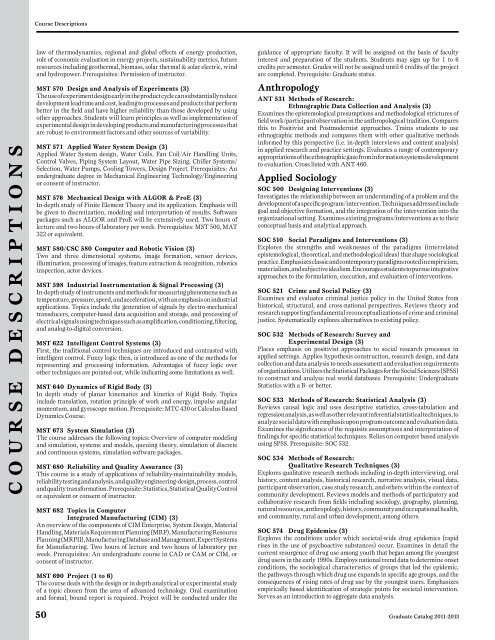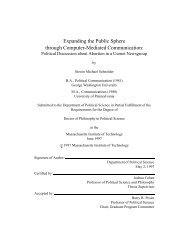COURSE DESCRIPTIONS - SUNY Institute of Technology
COURSE DESCRIPTIONS - SUNY Institute of Technology
COURSE DESCRIPTIONS - SUNY Institute of Technology
Create successful ePaper yourself
Turn your PDF publications into a flip-book with our unique Google optimized e-Paper software.
Course Descriptions<br />
<strong>COURSE</strong> <strong>DESCRIPTIONS</strong><br />
law <strong>of</strong> thermodynamics, regional and global effects <strong>of</strong> energy production,<br />
role <strong>of</strong> economic evaluation in energy projects, sustainability metrics, future<br />
resources including geothermal, biomass, solar thermal & solar electric, wind<br />
and hydropower. Prerequisites: Permission <strong>of</strong> instructor.<br />
MST 570 Design and Analysis <strong>of</strong> Experiments (3)<br />
The use <strong>of</strong> experiment design early in the product cycle can substantially reduce<br />
development lead time and cost, leading to processes and products that perform<br />
better in the field and have higher reliability than those developed by using<br />
other approaches. Students will learn principles as well as implementation <strong>of</strong><br />
experimental design in developing products and manufacturing processes that<br />
are robust to environment factors and other sources <strong>of</strong> variability.<br />
MST 571 Applied Water System Design (3)<br />
Applied Water System design, Water Coils, Fan Coil/Air Handling Units,<br />
Control Valves, Piping System Layout, Water Pipe Sizing, Chiller Systems/<br />
Selection, Water Pumps, Cooling Towers, Design Project. Prerequisites: An<br />
undergraduate degree in Mechanical Engineering <strong>Technology</strong>/Engineering<br />
or consent <strong>of</strong> instructor.<br />
MST 576 Mechanical Design with ALGOR & ProE (3)<br />
In-depth study <strong>of</strong> Finite Element Theory and its application. Emphasis will<br />
be given to discretization, modeling and interpretation <strong>of</strong> results. S<strong>of</strong>tware<br />
packages such as ALGOR and ProE will be extensively used. Two hours <strong>of</strong><br />
lecture and two hours <strong>of</strong> laboratory per week. Prerequisites: MST 500, MAT<br />
322 or equivalent.<br />
MST 580/CSC 580 Computer and Robotic Vision (3)<br />
Two and three dimensional systems, image formation, sensor devices,<br />
illumination, processing <strong>of</strong> images, feature extraction & recognition, robotics<br />
inspection, actor devices.<br />
MST 598 Industrial Instrumentation & Signal Processing (3)<br />
In-depth study <strong>of</strong> instruments and methods for measuring phenomena such as<br />
temperature, pressure, speed, and acceleration, with an emphasis on industrial<br />
applications. Topics include the generation <strong>of</strong> signals by electro-mechanical<br />
transducers, computer-based data acquisition and storage, and processing <strong>of</strong><br />
electrical signals using techniques such as amplification, conditioning, filtering,<br />
and analog-to-digital conversion.<br />
MST 622 Intelligent Control Systems (3)<br />
First, the traditional control techniques are introduced and contrasted with<br />
intelligent control. Fuzzy logic then, is introduced as one <strong>of</strong> the methods for<br />
representing and processing information. Advantages <strong>of</strong> fuzzy logic over<br />
other techniques are pointed out, while indicating some limitations as well.<br />
MST 640 Dynamics <strong>of</strong> Rigid Body (3)<br />
In depth study <strong>of</strong> planar kinematics and kinetics <strong>of</strong> Rigid Body. Topics<br />
include translation, rotation principle <strong>of</strong> work and energy, impulse angular<br />
momentum, and gyroscope motion. Prerequisite: MTC 430 or Calculus Based<br />
Dynamics Course.<br />
MST 673 System Simulation (3)<br />
The course addresses the following topics: Overview <strong>of</strong> computer modeling<br />
and simulation, systems and models, queuing theory, simulation <strong>of</strong> discrete<br />
and continuous systems, simulation s<strong>of</strong>tware packages.<br />
MST 680 Reliability and Quality Assurance (3)<br />
This course is a study <strong>of</strong> applications <strong>of</strong> reliability-maintainability models,<br />
reliability testing and analysis, and quality engineering-design, process, control<br />
and quality transformation. Prerequisite: Statistics, Statistical Quality Control<br />
or equivalent or consent <strong>of</strong> instructor.<br />
MST 682 Topics in Computer<br />
Integrated Manufacturing (CIM) (3)<br />
An overview <strong>of</strong> the components <strong>of</strong> CIM Enterprise, System Design, Material<br />
Handling, Materials Requirement Planning (MRP), Manufacturing Resource<br />
Planning (MRPII), Manufacturing Database and Management, Expert Systems<br />
for Manufacturing. Two hours <strong>of</strong> lecture and two hours <strong>of</strong> laboratory per<br />
week. Prerequisites: An undergraduate course in CAD or CAM or CIM, or<br />
consent <strong>of</strong> instructor.<br />
MST 690 Project (1 to 6)<br />
The course deals with the design or in depth analytical or experimental study<br />
<strong>of</strong> a topic chosen from the area <strong>of</strong> advanced technology. Oral examination<br />
and formal, bound report is required. Project will be conducted under the<br />
guidance <strong>of</strong> appropriate faculty. It will be assigned on the basis <strong>of</strong> faculty<br />
interest and preparation <strong>of</strong> the students. Students may sign up for 1 to 6<br />
credits per semester. Grades will not be assigned until 6 credits <strong>of</strong> the project<br />
are completed. Prerequisite: Graduate status.<br />
Anthropology<br />
ANT 531 Methods <strong>of</strong> Research:<br />
Ethnographic Data Collection and Analysis (3)<br />
Examines the epistemological presumptions and methodological strictures <strong>of</strong><br />
field work/participant observation in the anthropological tradition. Compares<br />
this to Positivist and Postmodernist approaches. Trains students to use<br />
ethnographic methods and compares them with other qualitative methods<br />
informed by this perspective (i.e. in-depth interviews and content analysis)<br />
in applied research and practice settings. Evaluates a range <strong>of</strong> contemporary<br />
appropriations <strong>of</strong> the ethnographic gaze from information systems development<br />
to evaluation. Cross listed with ANT 460.<br />
Applied Sociology<br />
SOC 500 Designing Interventions (3)<br />
Investigates the relationship between an understanding <strong>of</strong> a problem and the<br />
development <strong>of</strong> a specific program/intervention. Techniques addressed include<br />
goal and objective formation, and the integration <strong>of</strong> the intervention into the<br />
organizational setting. Examines existing programs/interventions as to their<br />
conceptual basis and analytical approach.<br />
SOC 510 Social Paradigms and Interventions (3)<br />
Explores the strengths and weaknesses <strong>of</strong> the paradigms (interrelated<br />
epistemological, theoretical, and methodological ideas) that shape sociological<br />
practice. Emphasizes classic and contemporary paradigms rooted in empiricism,<br />
materialism, and subjective idealism. Encourages students to pursue integrative<br />
approaches to the formulation, execution, and evaluation <strong>of</strong> interventions.<br />
SOC 521 Crime and Social Policy (3)<br />
Examines and evaluates criminal justice policy in the United States from<br />
historical, structural, and cross-national perspectives. Reviews theory and<br />
research supporting fundamental reconceptualizations <strong>of</strong> crime and criminal<br />
justice. Systematically explores alternatives to existing policy.<br />
SOC 532 Methods <strong>of</strong> Research: Survey and<br />
Experimental Design (3)<br />
Places emphasis on positivist approaches to social research processes in<br />
applied settings. Applies hypothesis construction, research design, and data<br />
collection and data analysis to needs assessment and evaluation requirements<br />
<strong>of</strong> organizations. Utilizes the Statistical Packages for the Social Sciences (SPSS)<br />
to construct and analyze real world databases. Prerequisite: Undergraduate<br />
Statistics with a B- or better.<br />
SOC 533 Methods <strong>of</strong> Research: Statistical Analysis (3)<br />
Reviews causal logic and uses descriptive statistics, cross-tabulation and<br />
regression analysis, as well as other relevant inferential statistical techniques, to<br />
analyze social data with emphasis upon program outcome and evaluation data.<br />
Examines the significance <strong>of</strong> the requisite assumptions and interpretation <strong>of</strong><br />
findings for specific statistical techniques. Relies on computer based analysis<br />
using SPSS. Prerequisite: SOC 532.<br />
SOC 534 Methods <strong>of</strong> Research:<br />
Qualitative Research Techniques (3)<br />
Explores qualitative research methods including in-depth interviewing, oral<br />
history, content analysis, historical research, narrative analysis, visual data,<br />
participant observation, case study research, and others within the context <strong>of</strong><br />
community development. Reviews models and methods <strong>of</strong> participatory and<br />
collaborative research from fields including sociology, geography, planning,<br />
natural resources, anthropology, history, community and occupational health,<br />
and community, rural and urban development, among others.<br />
SOC 574 Drug Epidemics (3)<br />
Explores the conditions under which societal-wide drug epidemics (rapid<br />
rises in the use <strong>of</strong> psychoactive substances) occur. Examines in detail the<br />
current resurgence <strong>of</strong> drug use among youth that began among the youngest<br />
drug users in the early 1990s. Employs national trend data to determine onset<br />
conditions, the sociological characteristics <strong>of</strong> groups that led the epidemic,<br />
the pathways through which drug use expands in specific age groups, and the<br />
consequences <strong>of</strong> rising rates <strong>of</strong> drug use by the youngest users. Emphasizes<br />
empirically based identification <strong>of</strong> strategic points for societal intervention.<br />
Serves as an introduction to aggregate data analysis.<br />
50 Graduate Catalog 2011-2013
















